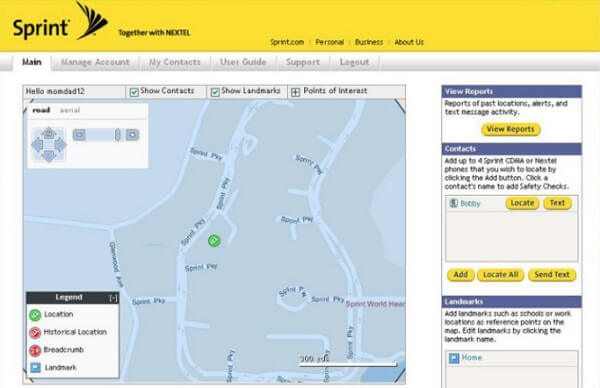
Your smartphone can and probably is tracking your location, whether you agree to it or not. It’s like there are spying eyes everywhere, sounds crazy and scary, right? Actually, GPS technology has been put to good use while we use location-based apps for convenience and safety. However, markerters may exploit this technology to send target ads. Some third-parties share or even sell location data for profits. That’s why you need to know how your smartphone tracks your every move and prevent it from doing so.
How does your smartphone track your every move?
Now cell phones are equipped with WiFi and GPS chip. They work by detecting the position and signal from a series of satellites. But it’s difficult for the antenna in your device to track your location via GPS, if you are in a location without a clear view. Thus, your smartphone can constantly seek WiFi access points like beacons, home routers and publicly broadcasting data back to them.
With this technology, your smartphone can determine your accurate location and make location tracking apps and services work properly. They create a baseline of your geolocation data and paint a more complete digital profile of you with every move you make.
Beacon service
The cell phones need to communicate with nearest cellular tower for voice and data communication, so it may not be practical to disable cellular access. Even if you turn off the access, your phone would still send out beacons if WiFi or Bluetooth are enabled.
Near-field communications(NFC) can be used for various payment services. For instance, it is used for Apple Pay on an iPhone. It’s not possible to set up Apple Pay without activating NFC. Devices on the latest versions of Android and iOS can detect NFC tags and they can decode transmissions containing NDEF data. Two NFC-enabled smartphones or devices can communicate with each other and share information in peer-to-peer network. Applications can exploit the capability to enable users to get things done swiftly like media files exchange, mobile payments and more.
Location service
Mapping apps on your cell phone free you from carrying around a paper maps or stopping to ask a stranger for directions. Apple Maps, Google Maps and other mapping apps use the GPS module to identify the location of a mobile phone and provide directions to your destination. It makes sense to enable location services for mapping apps and most of us believe that an app’s benefits outweigh its risks.

However, there are some apps – free ones in particular – requesting excessive, unnecessary permissions so as to sell the collected location data. For example, calculator apps do not need access to your GPS service, even weather apps do not need to enable GPS on the device, and users imply need to enter the desired location to know the weather.
Apps give away personal data
Before investing in an application, it’s better to conduct some research. If the app collects or stores sensitive data, it’s essential to know whether the data is encrypted in transit and at rest. It’s reported that 7 in 10 apps share personal data, such as location and what apps a person uses, with companies that exist to track users online and in the physical world. While 15% of the apps send that data to five or more tracking sites.
Ad Tracking
It’s no surprising that websiet administrators use cookies to personalize your user experience. Cookies are also used to track your internet activity and serve advertisements. However, cookies are not as effective on cell phones, so companies use your device’s Mobile Advertising Identifier to target mobile phone users and serve your personalized ads. It identifies your phone and based on your activity or location, will send relevant ads to your device.
Browser settings
When you browse the internet, you can see browsers that ask location permission to deliver service. Your smartphone browser activity also provides advertisers, data brokers and others with a treasure trove of information about you.
How do you prevent your phone from being tracked?
As we mentioned before, your smartphone is tracking your move for navigation, target ads or location data sharing. Prior to downloading and installing an app, make sure the app developers have a privacy policy and try to obtain some useful information. You can review the privacy settings on your phone to control what it can access. The following are some useful tips to help prevent from being tracked.
- Shut down beacon service – If you want to turn off beaconing service, consider enabling airplane/flight mode. You will still be able to play music and look at data already stored on your smartphone but your device won’t be able to communicate wirelessly.
- Disable location service – You can either turn location services off completely or just for selected apps. Navigate to Settings > Privacy on both Android and iOS devices.
- Ask to connect – Make sure your smartphone requests to join a network whenever it is detected, rather than automatically connecting to the strongest open network. Go to Settings > WiFi > toggle Ask to join Networks on.
- Utilize VPN – A virtual private network creates a private tunnel between your cell phone and the internet, which encrypts your traffic and web activity from snoops and hackers.
- Uninstall apps you rarely use – App developers may continuously update their apps but users who haven’t used the app in months are unlikely to install necessary updates. You can delete apps you haven’t used in 6 months or have long-forgotten.
Conclusion
Possible ways of your smartphone tracking your every move are covered in this guide, from basic location service to ads tracking. Some people might not care about this and are willing to trade the privacy if they believe the benefits of an app outweigh its risks. But if you want to stop your phone from giving away it location, the above mentioned tips can help you configure its settings as appropriate.



